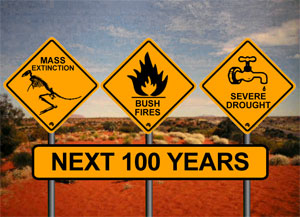
NEXT 100 YEARS - Mass Extinction, Bush Fires, Severe Drought
The day drew marching crowds worldwide, while one country facing a nasty climate-changed future saw some of its biggest ever environmental rallies - Australia.
The 40,000 in Sydney, 40,000 in Melbourne, plus twenty six other population centres who protested could be having their ‘Katrina’ moment over the next few months as the country goes into its worst droughts for 1000 years – after the hottest year on record - and the reality of climate change becomes irrefutable, even to right-wing politicians.
Australia generates the highest carbon emissions per head in the world, as well as the highest water usage per head, yet these marches show a clear distance between the population and a government which remains a firm ally of the US’s ‘flat earth society’ climate change denial club. During his recent speaking tour, Al Gore asked to meet prime minister John Howard who refused saying he “didn’t take policy advice from a film.” The Industry Minister Ian MacFarlane also declined, saying he wouldn’t listen to the opinion of “an unsuccessful US presidency candidate who could not convince (his) own people.”
Time To Give A XXXX
The climate change prognosis for Australia is harsh - less rainfall in the populated southern areas, with a possible 40% drop in rainfall and 6 degree increase in temperature by 2070. While this will drastically affect all the eco-systems in the country with a myriad of knock-on affects, extinctions and other chaotic ecocide, it will also make supporting a resource-greedy population on the driest continent on earth even less sustainable than it already wasn’t.
For starters the production of food will become much more difficult; large areas of farmland will stop being viable, crops will get damaged by extreme weather and savage bushfires, as well as outbreaks of pests and disease. Already Australian farmers use 75% of the country’s water - on arid soil bolstered with artificial fertilizers – and this usage makes Aussies the biggest consumers of piped water per head in the world. As this year’s drought kicks in – for a fifth year in a row - wheat harvest estimates are down by 62% from last year, while global grain stores are at a 25 year low. And on top of this, Oz agriculture relies on freighting food large distances, which makes it very oil dependent. SchNEWS’ correspondent in Melbourne knows a man moving to New Zealand claiming to be Australia’s first environmental refugee.
But Down Under, human-created environmental problems are nothing new as massive deforestation, urbanisation and radical changes in land use have already had major affects over the past century. Take Perth, Australia’s most precarious city water-wise: due to deforestation, south-west WA has seen an incredible drop of 85-90% in winter rainfall, and inflow into Perth’s reservoirs is down 66% since the 1970s. This in a rapidly growing city of 1.5 million which has doubled its population since 1975.
But it’s not all just desertification; as sea temperatures rise by 1.5–4.5 degrees this century, the Great Barrier Reef off the coast of Queensland – the world’s largest coral reef system stretching for 1600 miles with 3,000 reefs and 900 islands - could lose 95% percent of its living coral by 2050 due to climate change. And that’s the best-case scenario!
"The far-sighted government is committing itself to more coal power. The New South Wales government trying to push through a massive expansion of exports with the doubling of the world’s biggest coal port at Newcastle NSW, and there are proposals for a large open-cut coal mine at Anvil Hill in the Hunter Valley – a plan currently the being taken to court by environmentalist Peter Gray. Last Saturday during the climate protests, 800 assembled on the beach to spell the words ‘Beyond Coal’ (for more see www.risingtide.org.au).
The majority of Australians who enjoy a high-consumption lifestyle are facing a steep ‘descent’ in consumption, and similar to everywhere else, will be forced to make changes while their government tries to pretend it’s not all happening. For an Aussie take on dealing with ‘energy descent’, surviving peak oil and looming food insecurity, Eat The Suburbs have this guide www.eatthesuburbs.org/edap-primer
* For more see www.cana.net.au
-------------------------------------------------------------
For the rest of this weeks issue including articles on Faslane and Israel check out the website.

 e-mail:
e-mail:
 Homepage:
Homepage: